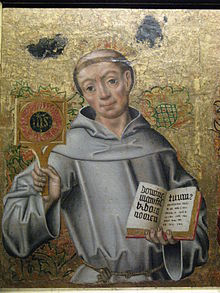St Bernardino of Siena

Franciscan preacher. Bernadino was born at Massa di Carrera in 1380, and brought up by an aunt after his parents died. As a young man he took charge of the La Scala hospital at Siena after most of the staff died of plague. He then looked after his bedridden aunt until her death. In 1402 he became a Franciscan friar and soon began to make a name for himself as a preacher. For many years he journeyed on foot, preaching up and down Italy in churches and in the open air. For eight years his teaching was criticised by the University of Bologna, but eventually they decided in his favour.
Called the 'people's preacher', St Bernardino spoke out relentlessly against usury. He also denounced the strife between different Italian cities. He was best known for his devotion to Jesus. At the end of his sermons he would hold up a plaque with the letters IHS. It is said that these letters became so popular, card-makers who had been ruined by the saint's denunciation of gambling, recouped their losses, by selling the religious plaques instead. They can still be seen in churches in Tuscany and elsewhere.
For a time he was vicar general of his order and worked hard to restore a stricter observance of the Franciscan rule. During his office, vocations to the order increased tenfold. He set up schools of theology and took part in the Council of Florence which attempted to reunite the Eastern and Western Churches.
But in 1443 he resigned and went back to his favourite task of preaching. He died on this day in 1444 in Abruzzi. Ten years later he was canonised.
There were many mediaeval paintings of him, generally depicting him as a small man with burning eyes holding the IHS plaque. Sometimes he is shown with three mitres at his feet - representing three bishoprics he refused. His cult spread to England especially with the Observant Friars who set up their first foundation in Greenwich in 1482 and became a province of five houses by 1499.












